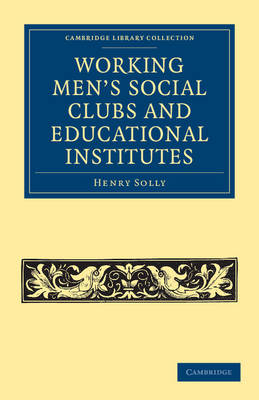
Working Men's Social Clubs and Educational Institutes
Cambridge University Press (Verlag)
978-1-108-03622-1 (ISBN)
Social reformer, Chartist sympathiser, advocate of universal suffrage, and opponent of slavery, Henry Solly (1813–1903) was a man driven by the desire to stamp out inequality. As part of his mission to improve the lives of working-class people, he founded the Working Men's Club and Institute Union, becoming its first paid secretary in 1863. The Union encouraged the formation of social and educational clubs where working men could 'meet for conversation, business, and mental improvement, with the means of recreation and refreshment, free from intoxicating drinks'. His tireless campaigning led directly to the formation of the Charity Organization Society, which advocated the principle of aiding those prepared to help themselves. Published in 1867, this is Solly's vigorous manifesto for social reform based around temperance and the formation of social clubs and educational institutes for working men.
Dedicatory letter to the Rev. F. D. Maurice; 1. Historical sketch; 2. A glance at the progress of the movement since 1862; 3. General review and present position of the movement; 4. Working men's clubs and institutes in their relation to the upper classes and to national progress; 5. How can clubs be made self-supporting?; 6. How to make clubs self-destructive; 7. Hints on the best means for preventing the formation of working men's clubs and institutes; 8. How to make clubs and institutes attractive; 9. Further suggestions for interesting working men more generally in the movement; 10. Neutral position of working men's clubs in religious, political, and social controversies; 11. Ought religious and political discussions to be introduced into working men's clubs?; 12. Ought dramatic entertainments and dancing to be introduced in working men's clubs and institutes?; 13. Village clubs; 14. Soldiers' institutes; 15. Youths' clubs and institutes; 16. Amusement and education combined in working men's clubs and institutes; 17. A working men's industrial college, and its relation to working men's clubs; 18. District unions of clubs, and co-operation between individual clubs; Appendix; Index.
| Erscheint lt. Verlag | 10.11.2011 |
|---|---|
| Reihe/Serie | Cambridge Library Collection - British and Irish History, 19th Century |
| Zusatzinfo | Worked examples or Exercises |
| Verlagsort | Cambridge |
| Sprache | englisch |
| Maße | 140 x 216 mm |
| Gewicht | 420 g |
| Themenwelt | Geschichte ► Allgemeine Geschichte ► Neuzeit (bis 1918) |
| Geisteswissenschaften ► Geschichte ► Regional- / Ländergeschichte | |
| Geschichte ► Teilgebiete der Geschichte ► Kulturgeschichte | |
| Geschichte ► Teilgebiete der Geschichte ► Sozialgeschichte | |
| Sozialwissenschaften ► Soziologie | |
| ISBN-10 | 1-108-03622-8 / 1108036228 |
| ISBN-13 | 978-1-108-03622-1 / 9781108036221 |
| Zustand | Neuware |
| Haben Sie eine Frage zum Produkt? |
aus dem Bereich


